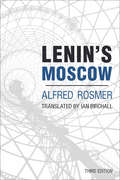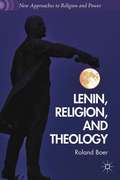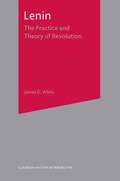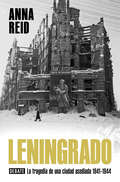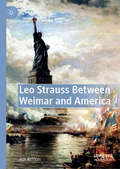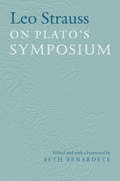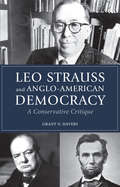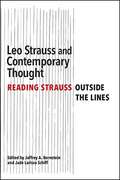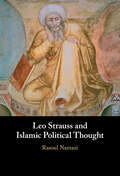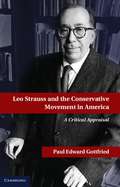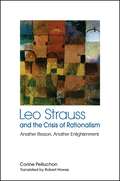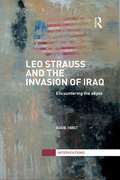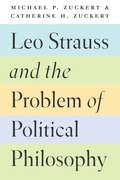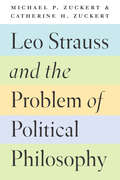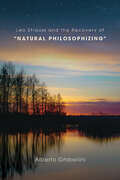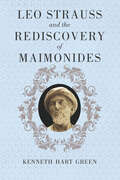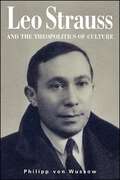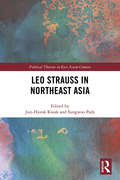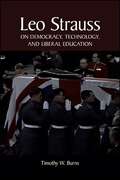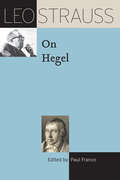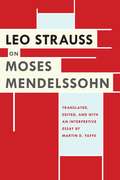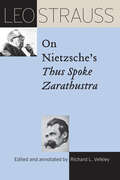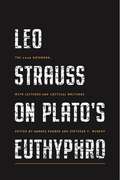- Table View
- List View
Lenin's Moscow
by Alfred Rosmer Ian BirchallWhen Alfred Rosmer arrived in Russia in 1919 it was considered by millions to be the center of world revolution. It was also a society beleaguered by civil war and encircled by hostile powers seeking to snuff out the promise and potential the first successful workers' revolution represented. It was in this context that revolutionaries from across the globe undertook the creation of the Communist International, hoping to forge an instrument to fan the flames of the struggle against global capitalism.In this gripping political memoir of his time in Moscow, Rosmer draws on his unique perspective as both a delegate to the Comintern-and as a member of its Executive Committee-to paint a stunning and inspiring picture of the early years of Soviet rule. From the debates sparked by the publication of Lenin's State and Revolution and Left-Wing Communism to the efforts of the International to extend its influence beyond Europe with the Congress of the Peoples of the East in Baku, Rosmer documents key developments with an unparalleled clarity of vision and offers invaluable insights.
Lenin, Religion, and Theology
by Roland BoerBased on a careful reading of Lenin's Collected Works, Roland Boer pursues the implications for linking Lenin with religion and theology and seeks to bring Lenin into recent debates over the intersections between theology and the Left, between the Bible and political thought.
Lenin: The Practice and Theory of Revolution (European History In Perspective Ser.)
by James D. WhiteA political and intellectual biographical study of Lenin which focuses on those aspects of his thought and political activities that had a bearing on the accession of the Bolsheviks to power in Russia in 1917 and the creation of the Soviet state. The book places Lenin in the context of his times and shows his relationship to other socialist thinkers. In particular it locates Lenin within the development of Marxist thought in Russia. Its historiographical chapter reveals the political factors which influenced the way biographies of Lenin were written in the Soviet Union. The book makes extensive use of first-hand materials including sources from the Russian archives.
Leningrado: La tragedia de una ciudad asediada 1941-1944
by Anna ReidEl libro que rescata del olvido a los ciudadanos que quedaron atrapados entre los dos peores sistemas totalitarios de la historia. El 8 de septiembre de 1941, once semanas después de que Hitler lanzara el brutal ataque sorpresa contra la Unión Soviética, la denominada Operación Barbarroja, la ciudad de Leningrado fue sitiada. El asedio duró casi tres años y más de setecientos cincuenta mil civiles murieron de inanición. De haber caído la ciudad, la historia de la Segunda Guerra Mundial, y del siglo XX, habría sido muy distinta. Leningrado es un relato entreverado de historias personales que, a partir de crónicas y testimonios reales de diarios de ambos bandos, refleja la vida cotidiana de quienes vivieron el asedio, civiles europeos del siglo XX que soportaron terribles penurias: la búsqueda incesante de comida y agua; el desánimo progresivo y la pérdida de lazos familiares; saqueos, asesinatos y canibalismo; pero, al mismo tiempo, extraordinarias historias de valentía y entrega. Anna Reid revela también la decisión deliberada de los nazis de matar de hambre a los habitantes de Leningrado para llevarlos a la rendición, las consecuencias del error de cálculo de Hitler, la incompetencia y la crueldad de los altos mandos soviéticos. Asimismo, aborda una serie de preguntas que aún hoy piden respuesta: ¿el abrumador número de muertos fue tanto culpa de Stalin como de Hitler? ¿Cómo contribuyó al desastre la desconfianza de Stalin y Moscú hacia la antigua San Petersburgo, de tendencia occidental? ¿Por qué los alemanes no tomaron la ciudad? ¿Qué impidió que cayera en la anarquía? ¿Cómo lograron sobrevivir algunos? Un clásico indispensable, libro de referencia sobre el tema, hasta ahora inédito en castellano. La crítica ha dicho: «Una obra maestra. Con rigor y sin sensiblería, nos acerca una historia terrible, documentada con maestría y narrada de manera hermosa».Anthony Beevor «Magistral».Orlando Figes «Una forma admirable de narrar la extraordinaria historia del asedio. Retrata con intensidad lo que algunos consideramos el más espantoso episodio de la Segunda Guerra Mundial».Max Hastings «Impactante y necesario. Un estudio asombroso y conmovedor del precio impuesto por el poder político sin restricciones en ambos bandos».The Daily Mail «Un relato magistral y bellamente escrito, que genera un poderoso sentido de cercanía. Reid presta especial atención a los vívidos detalles humanos, sin ignorar el contexto más amplio».The Spectator «Documentado de manera impecable, con buen ritmo y una escritura bellísima, Leningrado es el nuevo libro de referencia sobre el tema, con una interpretación más afinada y objetiva para un nuevo siglo».Financial Times «Un relato detallado y desgarrador de la vida y la muerte en Leningrado que devuelve sus voces a las personas».The Wall Street Journal
Leo Strauss
by Robert HowseExamines the German and Jewish sources of Strauss's thought and the extent to which his philosophy can shed light on the crisis of liberal democracy.
Leo Strauss Between Weimar and America
by Adi ArmonThis is the first book-length examination of the impact Leo Strauss’ immigration to the United States had on this thinking. Adi Armon weaves together a close reading of unpublished seminars Strauss taught at the University of Chicago in the 1950s and 1960s with an interpretation of his later works, all of which were of course written against the backdrop of the Cold War. First, the book describes the intellectual environment that shaped the young Strauss’ worldview in the Weimar Republic, tracing those aspects of his thought that changed and others that remained consistent up until his immigration to America. Armon then goes on to explore the centrality of Karl Marx to Strauss’s intellectual biography. By analyzing an unpublished seminar Strauss taught with Joseph Cropsey at the University of Chicago in 1960, Armon shows how Strauss’ fragmentary, partial engagement with Marx in writing obscured the important role that Marxism actually played as an intellectual challenge to his later political thinking. Finally, the book explores the manifestations of Straussian doctrine in postwar America through reading Strauss’ The City and Man (1964) as a representative of his political teaching.
Leo Strauss On Plato's Symposium
by Leo Strauss Seth BenardeteThe first major piece of unpublished work by Leo Strauss to appear in more than thirty years, this volume offers the public the unprecedented experience of encountering this renowned scholar as his students did. Given as a course in autumn 1959 under the title "Plato's Political Philosophy," these provocative lectures-until now, never published, but instead passed down from one generation of students to the next-show Strauss at his subtle and insightful best.
Leo Strauss and Anglo-American Democracy: A Conservative Critique
by Grant HaversIn this original new study, Grant Havers critically interprets Leo Strauss's political philosophy from a conservative perspective. Most mainstream readers of Strauss have either condemned him from the Left as an extreme right-wing opponent of liberal democracy or celebrated him from the Right as a traditional defender of Western civilization. Rejecting both of these portrayals, Havers shifts the debate beyond the conventional parameters of our age. He persuasively shows that Strauss was neither a man of the Far Right nor a conservative. He was in fact a secular Cold War liberal who taught his followers to uphold Anglo-American democracy as the one true universal regime that does not need a specifically Christian foundation. Strauss firmly rejects the traditional conservative view held by Edmund Burke that Anglo-American democracy needs the leavening influence of Christian morality (love thy neighbor). Havers maintains that Strauss's refusal to recognize the role of Christianity in shaping Western civilization, though historically unjustified, is crucial to Strauss and the Straussian portrayal of Anglo-American democracy. In the Straussian view, the Anglo-American ideals of liberty, equality, and constitutional government owe more to the ancient Greek philosophers Plato and Aristotle than to the Christian tradition. In the process, Havers argues, Straussians end up rewriting history by falsely idealizing the ancient Greeks as the forerunners of modern liberal democracy, despite the Greek toleration of practices such as slavery and infanticide. Straussians also misrepresent statesmen of the Anglo-American political tradition such as Abraham Lincoln and Sir Winston Churchill as heirs to the ancient Greek tradition of statecraft, despite their indebtedness to Christianity. Havers contends that the most troubling implication of Straussianism is that it provides an ideological rationale for the aggressive spread of democratic values on a global basis while ignoring the preconditions that make these values possible. Concepts such as the rule of law, constitutional government, Christian morality, and the separation of church and state are not easily transplanted beyond the historic confines of Anglo-American civilization, as recent wars to spread democracy in the Middle East and Central Asia have demonstrated. This excellent study will be of interest not only to longtime readers of Strauss but also philosophers, political scientists, historians, religious studies scholars, and theologians.
Leo Strauss and Contemporary Thought: Reading Strauss Outside the Lines (SUNY series in the Thought and Legacy of Leo Strauss)
by Jeffrey A. Bernstein; Jade L. SchiffLeo Strauss's readings of historical figures in the philosophical tradition have been justly well explored; however, his relation to contemporary thinkers has not enjoyed the same coverage. In Leo Strauss and Contemporary Thought, an international group of scholars examines the possible conversations between Strauss and figures such as Walter Benjamin, Jacques Derrida, Michel Foucault, Charles Taylor, and Hans Blumenberg. The contributors examine topics including religious liberty, the political function of comedy, law, and the relation between the Ancients and the Moderns, and bring Strauss into many new and original discussions that will be of use to those interested in the thought of Strauss, the history of philosophy and political theory, and contemporary continental thought.
Leo Strauss and Islamic Political Thought
by Rasoul NamaziIn this book, Rasoul Namazi offers the first in-depth study of Leo Strauss' writings on Islamic political thought, a topic that interested Strauss over the course of his career. Namazi's volume focuses on several important studies by Strauss on Islamic thought. He critically analyzes Strauss's notes on Averroes' commentary on Plato's Republic and also proposes an interpretation of Strauss' theologico-political notes on the Arabian Nights. Namazi also interprets Strauss' essay on Alfarabi's enigmatic treatise, The Philosophy of Plato and provides a detailed commentary on his complex essay devoted to Alfarabi's summary of Plato's Laws. Based on previously unpublished material from Strauss' papers, Namazi's volume provides new insights into Strauss' reflections on religion, philosophy, and politics, and their relationship to wisdom, persecution, divine law, and unbelief in the works of key Muslim thinkers. His work presents Strauss as one of the most innovative historians and scholars of Islamic thought of all time.
Leo Strauss and The Theologico-Political Problem
by Heinrich MeierThis book, by one of the most prominent interpreters of Leo Strauss's thought, was the first to address the problem that Leo Strauss himself said was the theme of his studies: the theologico-political problem or the confrontation with the theological and the political alternative to philosophy as a way of life. In his theologico-political treatise, which comprises four parts and an appendix, Heinrich Meier clarifies the distinction between political theology and political philosophy and reappraises the unifying center of Strauss's philosophical enterprise. The book is the culmination of Meier's work on the theologico-political problem. It will interest anyone who seeks to understand both the problem caused by revelation for philosophy and the challenge posed by political-religious radicalism. The appendix makes available for the first time two lectures by Strauss that are immediately relevant to the subject of this book and that will open the way for future research and debate on the legacy of Strauss.
Leo Strauss and the Conservative Movement in America
by Paul E. GottfriedThis book offers an original interpretation of the achievement of Leo Strauss, stressing how his ideas and followers reshaped the American conservative movement. The conservative movement that reached out to Strauss and his legacy was extremely fluid and lacked a self-confident leadership. Conservative activists and journalists felt a desperate need for academic acceptability, which they thought Strauss and his disciples would furnish. They also became deeply concerned with the problem of 'value relativism', which self-described conservatives thought Strauss had effectively addressed. But until recently, neither Strauss nor his disciples have considered themselves to be 'conservatives'. Contrary to another misconception, Straussians have never wished to convert Americans to ancient political ideals and practices, except in a very selective rhetorical fashion. Strauss and his disciples have been avid champions of American modernity, and 'timeless' values as interpreted by Strauss and his followers often look starkly contemporary.
Leo Strauss and the Crisis of Rationalism: Another Reason, Another Enlightenment (SUNY series in the Thought and Legacy of Leo Strauss)
by Corine PelluchonHow can Leo Strauss's critique of modernity and his return to tradition, especially Maimonides, help us to save democracy from its inner dangers? In this book, Corine Pelluchon examines Strauss's provocative claim that the conception of man and reason in the thought of the Enlightenment is self-destructive and leads to a new tyranny. Writing in a direct and lucid style, Pelluchon avoids the polemics that have characterized recent debates concerning the links between Strauss and neoconservatives, particularly concerns over Strauss's relation to the extreme right in Germany. Instead she aims to demystify the origins of Strauss's thought and present his relationship to German and Jewish thought in the early twentieth century in a manner accessible not just to the small circles devoted to the study of Strauss, but to a larger public. Strauss's critique of modernity is, she argues, constructive; he neither condemns modernity as a whole nor does he desire a retreat back to the Ancients, where slaves existed and women were not considered citizens. The question is to know whether we can learn something from the Ancients and from Maimonides—and not merely about them.
Leo Strauss and the Invasion of Iraq: Encountering the Abyss (Interventions)
by Aggie HirstThe political philosophy of Leo Strauss has been the subject of significant scholarly and media attention in recent years, particularly in the context of the decision to invade Iraq in 2003. Allegations that a group of Strauss-inspired Neo-conservatives intervened in the foreign policy establishment of the US in order to realise the policy of 'regime change' began to emerge soon after the invasion, and unanswered questions remain a decade later. This book addresses these claims, focusing specifically on a group of Straussians active in the spheres of intelligence production, think tanks, and the media during the period from the 9/11 attacks to the invasion in 2003. Such an examination is intended not simply to identify and expose their activities promoting the policy of 'regime change' in Iraq during this period, but also to challenge them and the Straussian logics underpinning them. Utilising the thought of Jacques Derrida, the book enacts a deconstructive challenge to Strauss’ political philosophy which unsettles the fundamental assumptions it relies upon. In doing so, it exposes the securitising imperative underpinning Straussian thought and the Straussian interventions. It thereby simultaneously addresses crucial issues in political theory and contemporary foreign policy studies, while asserting that these dimensions of international politics can and should be dealt with in conjunction with each other. This book would be of interest to students and scholars of Global Politics, Political Theory, Security Studies and US Foreign Policy, and those outside the academy interested in Neo-conservatism and the 2003 invasion of Iraq.
Leo Strauss and the Problem of Political Philosophy
by Catherine H. Zuckert Michael P. ZuckertLeo Strauss and his alleged political influence regarding the Iraq War have in recent years been the subject of significant media attention, including stories in the Wall Street Journal and New York Times. Time magazine even called him "one of the most influential men in American politics. ” With The Truth about Leo Strauss, Michael and Catherine Zuckert challenged the many claims and speculations about this notoriously complex thinker. Now, with Leo Strauss and the Problem of Political Philosophy, they turn their attention to a searching and more comprehensive interpretation of Strauss’s thought as a whole, using the many manifestations of the "problem of political philosophy” as their touchstone. For Strauss, political philosophy presented a "problem” to which there have been a variety of solutions proposed over the course of Western history. Strauss’s work, they show, revolved around recovering--and restoring--political philosophy to its original Socratic form. Since positivism and historicism represented two intellectual currents that undermined the possibility of a Socratic political philosophy, the first part of the book is devoted to Strauss’s critique of these two positions. Then, the authors explore Strauss’s interpretation of the history of philosophy and both ancient and modern canonical political philosophers, including Plato, Aristotle, Machiavelli, and Locke. Strauss’s often-unconventional readings of these philosophers, they argue, pointed to solutions to the problem of political philosophy. Finally, the authors examine Strauss’s thought in the context of the twentieth century, when his chief interlocutors were Schmitt, Husserl, Heidegger, and Nietzsche. The most penetrating and capacious treatment of the political philosophy of this complex and often misunderstood thinker, from his early years to his last works, Leo Strauss and the Problem of Political Philosophy reveals Strauss’s writings as an attempt to show that the distinctive characteristics of ancient and modern thought derive from different modes of solving the problem of political philosophy and reveal why he considered the ancient solution both philosophically and politically superior.
Leo Strauss and the Problem of Political Philosophy
by Catherine H. Zuckert Michael P. ZuckertLeo Strauss and his alleged political influence regarding the Iraq War have in recent years been the subject of significant media attention, including stories in the Wall Street Journal and New York Times.Time magazine even called him “one of the most influential men in American politics.” With The Truth about Leo Strauss, Michael and Catherine Zuckert challenged the many claims and speculations about this notoriously complex thinker. Now, with Leo Strauss and the Problem of Political Philosophy, they turn their attention to a searching and more comprehensive interpretation of Strauss’s thought as a whole, using the many manifestations of the “problem of political philosophy” as their touchstone. For Strauss, political philosophy presented a “problem” to which there have been a variety of solutions proposed over the course of Western history. Strauss’s work, they show, revolved around recovering—and restoring—political philosophy to its original Socratic form. Since positivism and historicism represented two intellectual currents that undermined the possibility of a Socratic political philosophy, the first part of the book is devoted to Strauss’s critique of these two positions. Then, the authors explore Strauss’s interpretation of the history of philosophy and both ancient and modern canonical political philosophers, including Plato, Aristotle, Machiavelli, and Locke. Strauss’s often-unconventional readings of these philosophers, they argue, pointed to solutions to the problem of political philosophy. Finally, the authors examine Strauss’s thought in the context of the twentieth century, when his chief interlocutors were Schmitt, Husserl, Heidegger, and Nietzsche. The most penetrating and capacious treatment of the political philosophy of this complex and often misunderstood thinker, from his early years to his last works, Leo Strauss and the Problem of Political Philosophy reveals Strauss’s writings as an attempt to show that the distinctive characteristics of ancient and modern thought derive from different modes of solving the problem of political philosophy and reveal why he considered the ancient solution both philosophically and politically superior.
Leo Strauss and the Recovery of "Natural Philosophizing" (SUNY series in the Thought and Legacy of Leo Strauss)
by Alberto Marco GhibelliniAmong the political philosophers of the twentieth century, Leo Strauss is usually singled out for his attempt to revitalize the ancient approach to counter the relativism of both historicism and positivism. It is less commonly underscored, however, that the cornerstone of this attempt is the recovery of the question of "nature," which he regarded as inseparable from genuine philosophy since its inception in ancient Greece. Leo Strauss and the Recovery of "Natural Philosophizing" addresses such a theme, focusing on the theoretical presuppositions that Strauss found at the basis of the acquired inability to raise the question of nature. Prominent among these is the encounter between philosophy and revelation, which, due to their conceptual incompatibility, leads to a condition Strauss metaphorically described as a "second, 'unnatural' cave" characterized by insurmountable "prejudices" rather than "appearance and opinion." These, however, are the starting point of genuine philosophy in the Platonic "first, 'natural' cave," which has to be regained, by way of historical deconstruction of the presuppositions of the second cave, if the "natural philosophizing" embodied by Socratic dialectics is to be reactivated.
Leo Strauss and the Rediscovery of Maimonides
by Kenneth Hart GreenIn Leo Strauss and the Rediscovery of Maimonides, Kenneth Hart Green explores the critical role played by Maimonides in shaping Leo Strauss’s thought. In uncovering the esoteric tradition employed in Maimonides’s Guide of the Perplexed, Strauss made the radical realization that other ancient and medieval philosophers might be concealing their true thoughts through literary artifice. Maimonides and al-Farabi, he saw, allowed their message to be altered by dogmatic considerations only to the extent required by moral and political imperatives and were in fact avid advocates for enlightenment. Strauss also revealed Maimonides’s potential relevance to contemporary concerns, especially his paradoxical conviction that one must confront the conflict between reason and revelation rather than resolve it. An invaluable companion to Green’s comprehensive collection of Strauss’s writings on Maimonides, this volume shows how Strauss confronted the commonly accepted approaches to the medieval philosopher, resulting in both a new understanding of Maimonides and a new depth and direction for his own thought. It will be welcomed by anyone engaged with the work of either philosopher.
Leo Strauss and the Theopolitics of Culture (SUNY series in the Thought and Legacy of Leo Strauss)
by Philipp von Wussow2020 CHOICE Outstanding Academic TitleIn this book, Philipp von Wussow argues that the philosophical project of Leo Strauss must be located in the intersection of culture, religion, and the political. Based on archival research on the philosophy of Strauss, von Wussow provides in-depth interpretations of key texts and their larger theoretical contexts. Presenting the necessary background in German-Jewish philosophy of the interwar period, von Wussow then offers detailed accounts and comprehensive interpretations of Strauss's early masterwork, Philosophy and Law, his wartime lecture "German Nihilism," the sources and the scope of Strauss's critique of modern "relativism," and a close commentary on the late text "Jerusalem and Athens." With its rare blend of close reading and larger perspectives, this book is valuable for students of political philosophy, continental thought, and twentieth-century Jewish philosophy alike. It is indispensable as a guide to Strauss's philosophical project, as well as to some of the most intricate details of his writings.
Leo Strauss in Northeast Asia (Political Theories in East Asian Context)
by Sungwoo Park Jun-Hyeok KwakThis book analyzes the reception of Leo Strauss and his political philosophy in Northeast Asia. By juxtaposing the central idea of Strauss’s political philosophy with the question of modernity, the contributors explore the eclectic adaptations of Strauss in Northeast Asian countries as a philosophical appropriation across cultures. Examining how Strauss’s philosophy was first introduced in Northeast Asia, the book sheds light on the similarities and differences in experiences, challenging the dominant approach which attributes various receptions of Strauss in Northeast Asia solely to sociopolitical circumstances. This book also seeks to move beyond a China-centric approach to investigate the possible transcultural appeals of Strauss’s political philosophy by exploring the cases of Japan and South Korea. Appealing to a wide network of scholars and practitioners in East Asia engaged in rethinking cultural particularities, this volume will be attractive to upper-level undergraduate students, graduate students, and advanced researchers in political philosophy, political theory, and Asian politics.
Leo Strauss on Democracy, Technology, and Liberal Education: On Democracy, Technology, And Liberal Education (SUNY series in the Thought and Legacy of Leo Strauss)
by Timothy W. BurnsLiberal democracy is today under unprecedented attack from both the left and the right. Offering a fresh and penetrating examination of how Leo Strauss understood the emergence of liberal democracy and what is necessary to sustain and elevate it, Leo Strauss on Democracy, Technology, and Liberal Education explores Strauss' view of the intimate (and troubling) relation between the philosophic promotion of liberal democracy and the turn to the modern scientific-technological project of the "conquest of nature." Timothy W. Burns explicates the political reasoning behind Strauss' recommendation of reminders of genuine political greatness within democracy over and against the failure of nihilistic youth to recognize it. Elucidating what Strauss envisaged by a liberally-educated sub-political or cultural-level aristocracy—one that could elevate and sustain liberal democracy—and the roles that both philosophy and divine-law traditions should have in that education, Burns also lays out Strauss' frequent (though often tacit) engagement with the thought of Heidegger on these issues.
Leo Strauss on Hegel (The Leo Strauss Transcript Series)
by Leo StraussIn the winter of 1965, Leo Strauss taught a seminar on Hegel at the University of Chicago. While Strauss neither considered himself a Hegelian nor wrote about Hegel at any length, his writings contain intriguing references to the philosopher, particularly in connection with his studies of Hobbes, in his debate in On Tyranny with Alexandre Koje`ve; and in his account of the “three waves” of modern political philosophy. Leo Strauss on Hegel reconstructs Strauss’s seminar on Hegel, supplemented by passages from an earlier version of the seminar from which only fragments of a transcript remain. Strauss focused his seminar on the lectures collected in The Philosophy of History, which he considered more accessible than Hegel’s written works. In his own lectures on Hegel, Strauss continues his project of demonstrating how modern philosophers related to ancient thought and explores the development and weaknesses of modern political theory. Strauss is especially concerned with the relationship in Hegel between empirical history and his philosophy of history, and he argues for the primacy of religion in Hegel’s understanding of history and society. In addition to a relatively complete transcript, Leo Strauss on Hegel also includes annotations, which bring context and clarity to the text.
Leo Strauss on Moses Mendelssohn
by Leo StraussMoses Mendelssohn (1729–86) was the leading Jewish thinker of the German Enlightenment and the founder of modern Jewish philosophy. His writings, especially his attempt during the Pantheism Controversy to defend the philosophical legacies of Spinoza and Leibniz against F. H. Jacobi’s philosophy of faith, captured the attention of a young Leo Strauss and played a critical role in the development of his thought on one of the fundamental themes of his life’s work: the conflicting demands of reason and revelation. Leo Strauss on Moses Mendelssohn is a superbly annotated translation of ten introductions written by Strauss to a multi-volume critical edition of Mendelssohn’s work. Commissioned in Weimar Germany in the 1920s, the project was suppressed and nearly destroyed during Nazi rule and was not revived until the 1960s. In addition to Strauss’s introductions, Martin D. Yaffe has translated Strauss’s editorial remarks on each of the passages he annotates in Mendelssohn’s texts and brings those together with the introductions themselves. Yaffe has also contributed an extensive interpretive essay that both analyzes the introductions on their own terms and discusses what Strauss writes elsewhere about the broader themes broached in his Mendelssohn studies. Strauss’s critique of Mendelssohn represents one of the largest bodies of work by the young Strauss on a single thinker to be made available in English. It illuminates not only a formerly obscure phase in the emergence of his thought but also a critical moment in the history of the German Enlightenment.
Leo Strauss on Nietzsche's Thus Spoke Zarathustra (The Leo Strauss Transcript Series)
by Leo Strauss Richard L. VelkleyAlthough Leo Strauss published little on Nietzsche, his lectures and correspondence demonstrate a deep critical engagement with Nietzsche’s thought. One of the richest contributions is a seminar on Nietzsche’s Thus Spoke Zarathustra, taught in 1959 during Strauss’s tenure at the University of Chicago. In the lectures, Strauss draws important parallels between Nietzsche’s most important project and his own ongoing efforts to restore classical political philosophy. With Leo Strauss on Nietzsche’s “Thus Spoke Zarathustra,” eminent Strauss scholar Richard L. Velkley presents Strauss’s lectures on Zarathustra with superb annotations that bring context and clarity to the critical role played by Nietzsche in shaping Strauss’s thought. In addition to the broad relationship between Nietzsche and political philosophy, Strauss adeptly guides readers through Heidegger’s confrontations with Nietzsche, laying out Heidegger’s critique of Nietzsche’s “will to power” while also showing how Heidegger can be read as a foil for his own reading of Nietzsche. The lectures also shed light on the relationship between Heidegger and Strauss, as both philosophers saw Nietzsche as a central figure for understanding the crisis of philosophy and Western civilization. Strauss’s reading of Nietzsche is one of the important—yet little appreciated—philosophical inquiries of the past century, both an original interpretation of Nietzsche’s thought and a deep engagement with the core problems that modernity posed for political philosophy. It will be welcomed by anyone interested in the work of either philosopher.
Leo Strauss on Plato’s Euthyphro: The 1948 Notebook, with Lectures and Critical Writings
by Hannes Kerber and Svetozar Y. MinkovLeo Strauss famously asserted that the fundamental, defining debate within Western civilization is that between Jerusalem and Athens, piety and philosophy, the Bible and Plato. And yet, surprisingly, Strauss never published any of his thoughts on Plato’s dialogue on piety, the Euthyphro.This volume presents, for the first time, Strauss’s 1948 notebook on the dialogue, written in preparation for a class at the New School for Social Research. Featuring close analysis and line-by-line commentary, the notebook opens a window onto a philosophic mind in action, as Strauss asks questions of the classic text, jots down observations and formulations, and analyzes very specific terms and arguments but also steps back, reviews the overall movement of the dialogue, and reconsiders previous conclusions. Beyond the notebook, the volume also brings together all the known materials that lay out Strauss’s thoughts on the Euthyphro. This includes newly transcribed and edited public lectures, illuminating appendixes, critical essays by volume editors Hannes Kerber and Svetozar Y. Minkov and scholar Wayne Ambler, an account of Strauss’s public lecture, and a new English translation of Plato’s Euthyphro by Seth Benardete, a classicist and one of Strauss’s students.Engaging and inspiring, Leo Strauss on Plato’s “Euthyphro” is a vital resource for scholars and students of political theory, readers interested in the intersection of philosophy and religion, and a must-have for anyone who studies Strauss.
